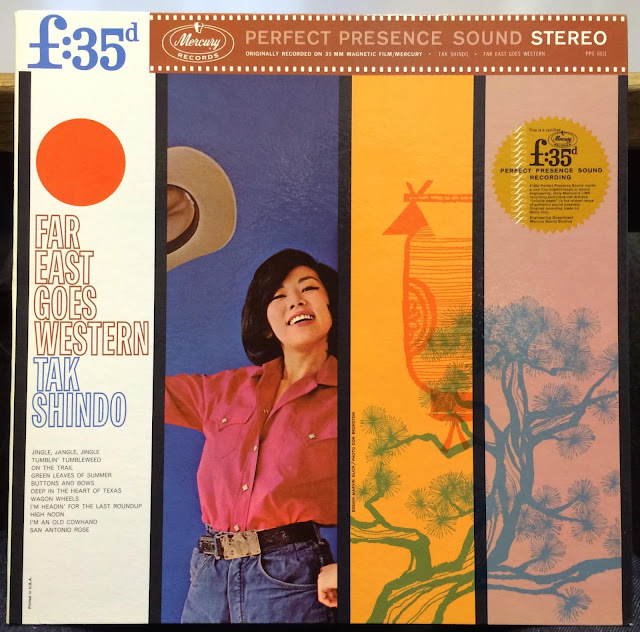Wild Country: Smooth in the Saddle
by Max Sparber
If you're feeling playful, it is almost inconsequentially easy to take a song from one genre and perform it in the style of another genre. This can sometimes be transformative, as with Ray Charles' soul covers of country western songs.
But there was an entire genre of easy listening music in the middle of the 20th century that pumped out album after album: light orchestral bandleader Annunzio Paolo Mantovani put out an astonishing 63 albums between 1949 and 1975, averaging about two per year.
These bands mostly adapted existing material, often thematically, often adapting popular songs or hitching their wagons to popular trends: If we go back to Mantovani, he put out albums of film music, folk music, Christmas music, Latin music, tango music — you name it, he adapted it to cascading strings and put out an album.
Sooner or later, everyone discovers country and western music, and easy listening artists were no exceptions. Here are five of the most memorable easy listening adaptations of country and cowboy songs. Put you boots up on your coffee table, pour yourself some soothing tea, and loosen your lariat for a moment, cowboy. This is music to relax to.
"I'm an old cowhand," Ray Conniff (1956)
"I'm an Old Cowhand (from the Rio Grand)," penned by Johnny Mercer for Bing Crosby, has long been a favorite of jazz artists, as it is a jazz tune in cowboy drag. But Ray Conniff and his collection of singers really give it the easy listening treatment in their rendition.The song is built over a clattering drum part that sounds like a recording of somebody walking down a hall very quickly, coupled with a push brass line that alternates between a deep bass note and horns blaring a major chord, approximately duplicating country flatpicking.
But almost instantly the singers kick in, scatting the melody in unison with some vaguely drunken-sounding horns. More voices will be added, and the horns will become increasing frantic as the song nears its chorus.
"Oklahoma Hills," Dave Pell (1957)
Cool jazz trumpeter Dave Pell out out an album of country songs called "High Definition Country," and it's largely cowboy songs, such as Woody Guthrie's western swing classic "Oklahoma Hills." This production alternates between swinging slowly and gently and then launching into a cerebral sort of New Orleans second line breakdown."Tumbling Tumbleweeds," Barney Kessel (1961)
Wrecking Crew guitarist Barney Kessel jumped on the Brazilian bossa nova trend in 1962, putting out an album of jazz standards that featured his electric guitar playing over a bossa nova beat, often with excitable brass stings.The strangest song on the album is his version of the Sons of the Pioneer's classic "Tumbling Tumbleweeds." Kessel plays the melody straight on his guitar, but horns swing wildly behind him, the whole of it over samba downbeats.
"Jingle, Jangle, Jingle," Tak Shindo (1962)
Japanese-American composer and arranger Tak Shindo is probably best-known for his exotica albums, which made extensive use of Eastern instruments and saturated Martin Denny-style arrangements. But Shindo also composed for the television shows "Gunsmoke" and "Wagon Train."His 1962 album "Far East Goes Western" was a self-conscious attempt to combine those two professional streams, based in Shindo's sense that there was something universal about music. And so he took a number of well-known cowboy songs, such as "Wagon Wheels" and "San Antonio Rose," and arranged them with Japanese instruments.
His arrangements don't seek to mimic Japanese folk music — the albums is still very much in style of American exotica. Take "Jingle, Jangle, Jingle" as an example — long a favorite among singing cowboys. The arrangement includes the melody being played out on lute, perhaps a biwa, but also includes jazz-style drumming, xylophones, cool saxophone playing, and harp strums.
The album was produced by Quincy Jones, by the way.
"Galveston," Lawrence Welk (1969)
Of all the artists on this list, Champagne Music impresario Lawrence Welk seems like he should have the best sense of what makes a good country western song. After all, he was born in Strasburg, North Dakota, spent several years as a chicken farmer in the cattle town of Omaha, Nebraska, and largely recorded his popular television show at the Hollywood Palladium, directly accross the street from Gower Gulch, where studios were still pumping out cowboy movies when "The Lawrence Welk Show" started and actual cowboys bided their time hoping for extra work.Of course, Welk's musical background was in ethnic white immigrant music (his childhood community was German speaking), which eventually developed into lush and deliberately square arrangements of popular standards for the same audience (who nonetheless never stopped complaining that Welk didn't perform enough polkas), so Welk's brand wasn't really all that country.
Nonetheless, Welk's version of Jimmy Webb's song "Galveston," popularized by Glen Campbell, is pretty terrific, featuring a twangy electric guitar, trippy sixties elements including a harpsichord-style fills, swirling strings, and cheery women's voices singing "bup bup bup: and the song's chorus, stripped down to "Galveston, oh Galveston!" It sounds like an especially memorable theme song to a 1970s soap opera.



Comments
Post a Comment